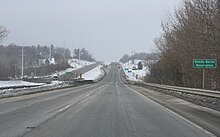Oneida Tribe of Indians of Wisconsin
 |
|
| Total population | |
|---|---|
| 21,321 (US Census 2000) | |
| Regions with significant populations | |
| Languages | |
| English, Oneida | |
| Religion | |
| Christianity, Native | |
| Related ethnic groups | |
| Mohawk, Onondaga, Cayuga, Seneca, Tuscarora |
The Oneida Nation of Wisconsin is a federally recognized tribe of Oneida people, with a reservation located in parts of two counties on the west side of the Green Bay metropolitan area. The reservation was established by treaty in 1838, and was allotted to individual New York Oneida tribal members as part of an agreement with the U.S. government. The land was individually owned until the tribe was formed under the Indian Reorganization Act of 1934.
Under the Dawes Act, the land was allotted in 1892 to individual households. The nation kept control of most of the land until sales were allowed in the early 20th century, when members were often tricked out of their property. They used the land for farming and harvesting timber. They now control about 22% of their former reservation property and are working to reacquire the land.
In 1988 the nation established the state's first modern lottery, known as Big Green. Since the late 20th century, the nation developed the gaming Ashwaubenon Casino on its property, which is generating revenue for economic development and welfare. Of the more than 21,000 members, roughly half live on the reservation.
The Oneida Nation of Wisconsin are descendants of an indigenous Iroquoian-speaking nation that arose in present-day central-western New York. They became one of the original Five Nations of the powerful Iroquois Confederacy. Although many Oneida of what was called the Christian Party had allied with the rebels during the American Revolutionary War, afterward the tribe was under pressure to cede lands in New York to the new federal government. Their territory was encroached on by European-American settlers and the people suffered from harassment by settlers who did not distinguish between former allies and enemies (four of the six Iroquois nations had been allied with the British.) Many began to relocate from New York in the 1820s and 1830s to Wisconsin, where they were offered land.
By a treaty in 1838, the Oneida accepted a reservation, and chief Daniel Bread negotiated to ensure that the land was to be held communally by the tribe. Oneida activists from Wisconsin and New York such as Laura Cornelius Kellogg (1880-1947) would make continual efforts to uphold Indian land claims.
...
Wikipedia
